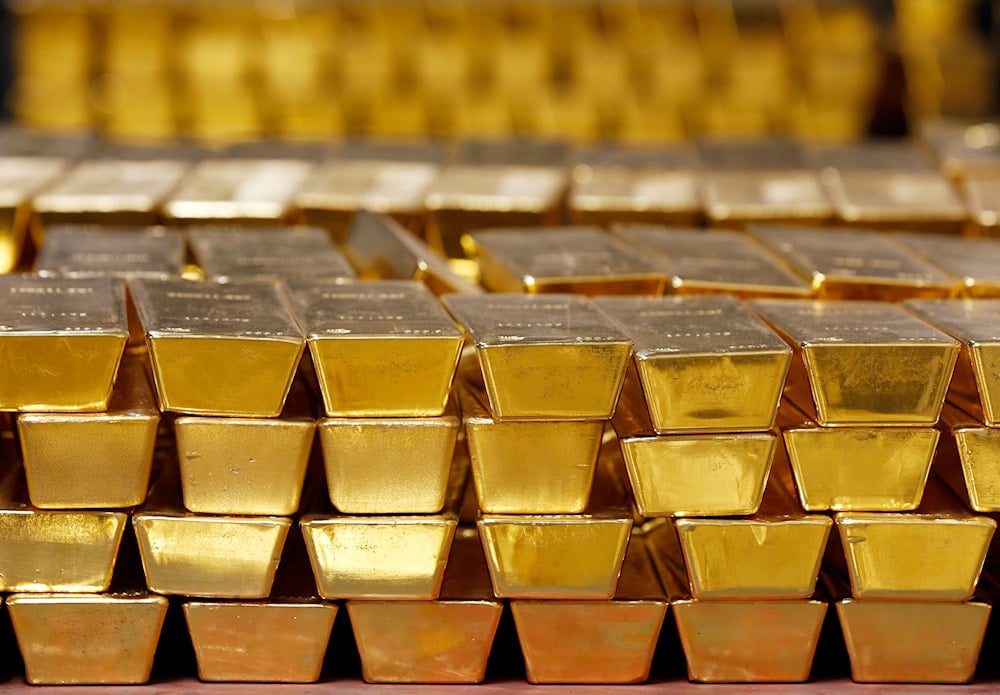Gold is being transported from the UK to the US amid fears of tariffs
Major banks are moving their gold in an attempt to dodge any potential tariffs Trump might impose on gold, as prices witness a surge in New York.
-

Gold bars are shown stacked in a vault at the United States Mint, on July 22, 2014, in West Point, N.Y. (AP)
Much of the gold stored in the Bank of England's underground vaults is being moved to New York amid fears of a trade war triggered by Trump throwing tariffs left and right, with the gold being worth more in Manhattan than in London.
The Bank of England's vaults, which are heavily fortified, hold hundreds of tons of gold, more than 400,000 bars of gold valued at around 200 billion pounds.
Traders are worried Trump is going to impose tariffs on gold after he imposed a 25% tariff on all steel and aluminum imports to the US, with the Deputy Governor of the Bank of England highlighting that the bank was "inundated with requests" after gold futures rose 11% in New York, closing at $2,935 a troy ounce on Thursday.
Around 8,000 bars have been moved from London to New York, constituting two percent of the total gold stored in Threadneedle's vaults, with financial institutions taking advantage of the situation; Banks like JPMorgan and HSBC are basically betting that the price of gold will go down.
These banks have access to large amounts of gold, which they lend to people or companies that need it as collateral (security for a loan), and in return, the banks charge interest on these loans, meanwhile, to protect themselves from losing money if gold prices drop, they sell gold contracts (called futures) in New York.
This way, if gold loses value, they can still make a profit or at least avoid big losses.
Trump's tariffs stir the world up
US President Donald Trump announced a 25% tariff on all steel and aluminum imports to the US starting February 10 in a measure that he described would affect everybody, in a move that sparked worldwide outrage at the United States' trade policies.
Previously, Trump announced tariffs targeting China, Canada and Mexico; a 25% levy on most exports from Canada and Mexico, and an additional 10% on Chinese goods on top of existing duties that were set by the Biden administration.
Trump suspended his levies on Canada and Mexico for 30 days after talks with the Prime Minister of Canada Justin Trudeau to reinforce his borders to reduce illegal immigration and the smuggling of fentanyl, which Trump previously cited as the reasons behind the tariffs.
China quickly responded on the same day by imposing its own set of levies on US exports, specifically a 15% tariff on US coal and liquefied natural gas, and a 10% tariff on crude oil, agricultural machinery, and certain cars.
Meanwhile, the European Union affirmed that it would respond "with firm and proper countermeasures" to Trump's decision, with European Commission President Ursula Von der Leyen saying that "Unjustified tariffs on the EU will not go unanswered - they will trigger firm and proportionate countermeasures. The EU will act to safeguard its interests."
The German Chancellor Olaf Sholz echoed this stance, adding that "If the US leaves us no other choice, then there will be a united reaction of the EU," he said, "will avoid the mistaken path of tariffs and counter-tariffs. Trade wars always cost both sides prosperity in the end."

 3 Min Read
3 Min Read










